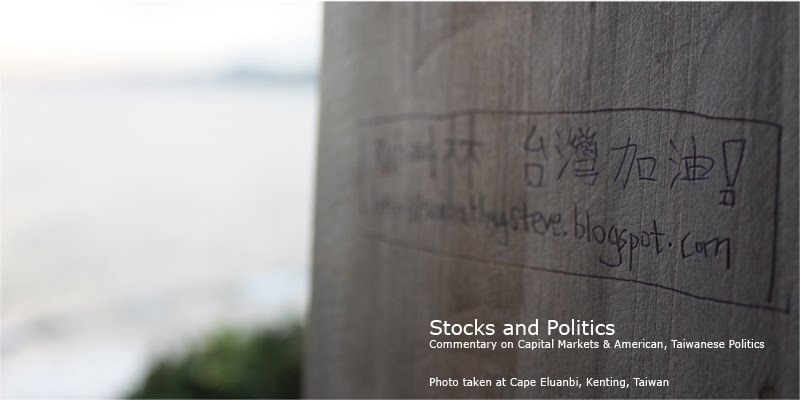This month's polls show President Ma still struggling to regain the confidence of the Taiwanese after the Morakot disaster. From the Global Views Magazine:
The unpopularity of Taiwanese president Ma Ying-jeou remains significantly high, according to a poll by Global Views. 58.6 per cent of respondents are dissatisfied with Ma’s performance, down one point since September.
From the low of about 23% approval rating right after the Morakot diaster, his approval rating has barely gained 6 points, now hanging at 29.5%, according to the article.
In another article that gives some other numbers, what's interesting to see is that the DPP still has work to do in giving the Taiwanese a different option than the KMT. Note that this piece also says the numbers are from the Global Views magazine, so I'm not sure where the discrepancy in the numbers are coming from (in the approval % of Ma Ying-Jeou).
The telephone survey of 1,004 adults by the Global View monthly magazine found that only 38.6 per cent trust President Ma Ying-jeou, who lags well behind Obama's 46.1-per-cent trust rate.
While 35.4 per cent trust Tsai Ying-wen, chairwoman of Taiwan's pro-independence opposition Democratic Progressive Party, only 17.5 per cent trust Hu.
Here, it has Ma's "trust" at 38.6%, which possibly could be different from the "satisfaction/approval" rating of the earlier article. I think more importantly is the number of Tsai Ing-wen, whose "trust" rating is still lower than Ma's. Rightfully so, Hu Jintao of the Communist Party of China is the lowest, but not nearly as low as I would have thought most Taiwanese would see him.
These numbers should be a reminder for the DPP that they still have a lot of work to do leading into the December local-elections, as well as the 2012 presidential election. Even with the "feeling" in the air that the majority of Taiwanese are upset or unsatisfied with the performance of Ma and his administration, the polls show that it might not necessarily translate into actual numbers in the elections.
Whether it's a problem of complacency, political bribery, political oppression, or something else, the next movement in the political theater of Taiwan must and can really only be initiated and sustained by the younger generation of Taiwanese. Our fathers, mothers, grandfathers, grandmothers have done their part, and with each passing of the elder, there needs to be one of us who steps up to take their place.
While I may have an opinion on gay marriage that certainly isn't "popular" these days, and not to take anything away from the homosexual communities' efforts to attain similar rights as heterosexuals, there is a deep pain and inability to understand why the recent march for gay pride/marriage in Taiwan can bring us (the "Gen Y") out in droves, along with the support of celebrities, while the most basic human rights and safeguarding those rights via democracy, garners little excitement among us.
Is it because we are taking the rights that our parents and grandparents secured for us, for granted? Is it because we are too caught up with ourselves and what our selfish wants are, that we can't think for anyone else other than ourselves? Is it because we are in the now, and our complacency leads us to be blinded from the future consequences that being apathetic will do to us, to Taiwanese, to Taiwan? How can we be so proud of being Taiwanese, and yet don't give a damn about the problems that Ma Ying-Jeou is bringing upon Taiwan.
It is a problem that has crossed my mind many times over and over, and something that I hope my blogging helps to mend, especially to those of my generation. Even if it's just one person that gets a glimpse of what I mean, at least I can say I did my part. Can you?
P.S.: I know my blogging is intermittent and definitely not consistent, but a good way to keep up with me if you have a blogger account (you can use your GMail account to sign-in), is to click on "Follow" at the top of the page, and you can set your settings to get e-mail updates. If you don't have a blogger/blogspot account, you can subscribe to my posts via the "E-mail Subscription" box on the top right, below my banner. I say this because I know a lot of you (especially my friends) have expressed positive remarks about my blog and I feel like I'm doing a disservice to you guys by not blogging regularly. And from that, it inadvertently causes you to not check back regularly. So, one way to help alleviate this is to get a subscription!







